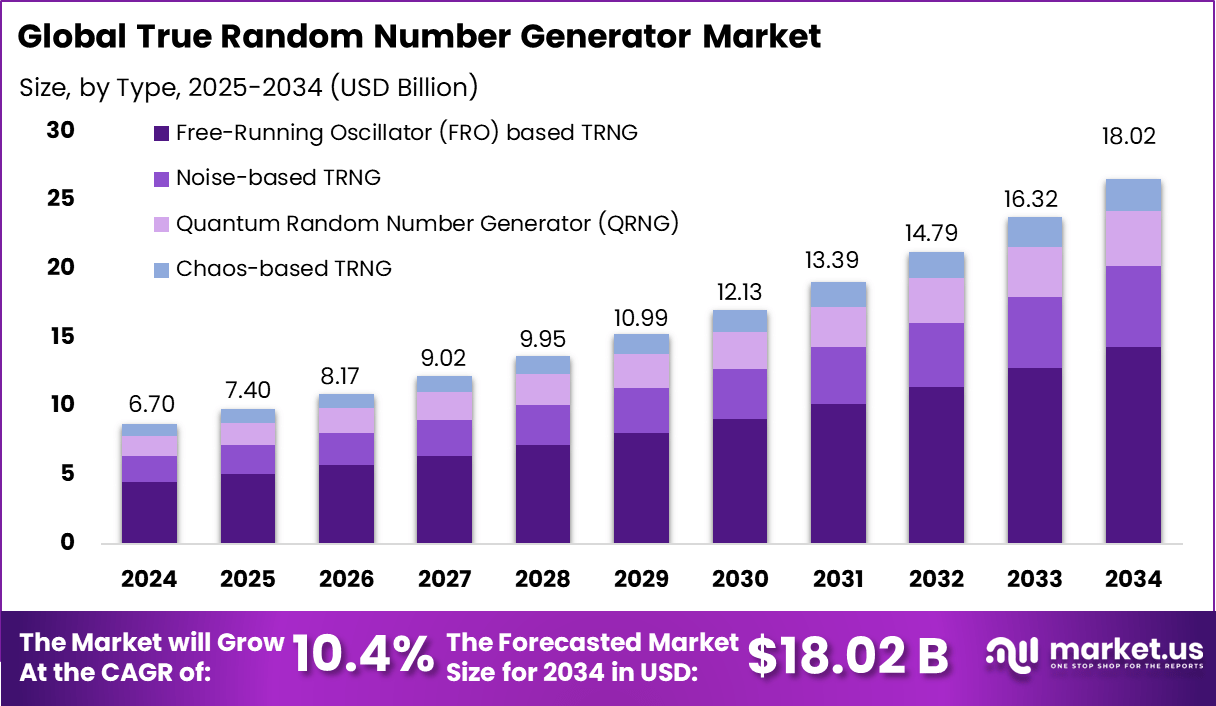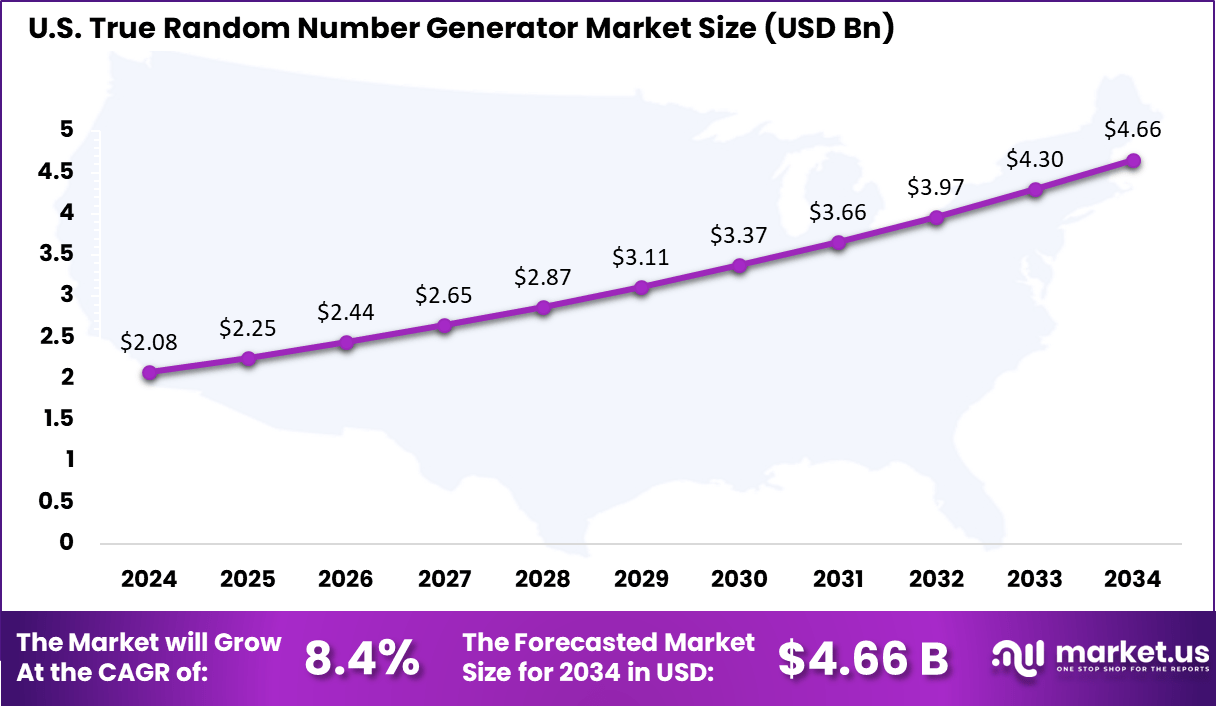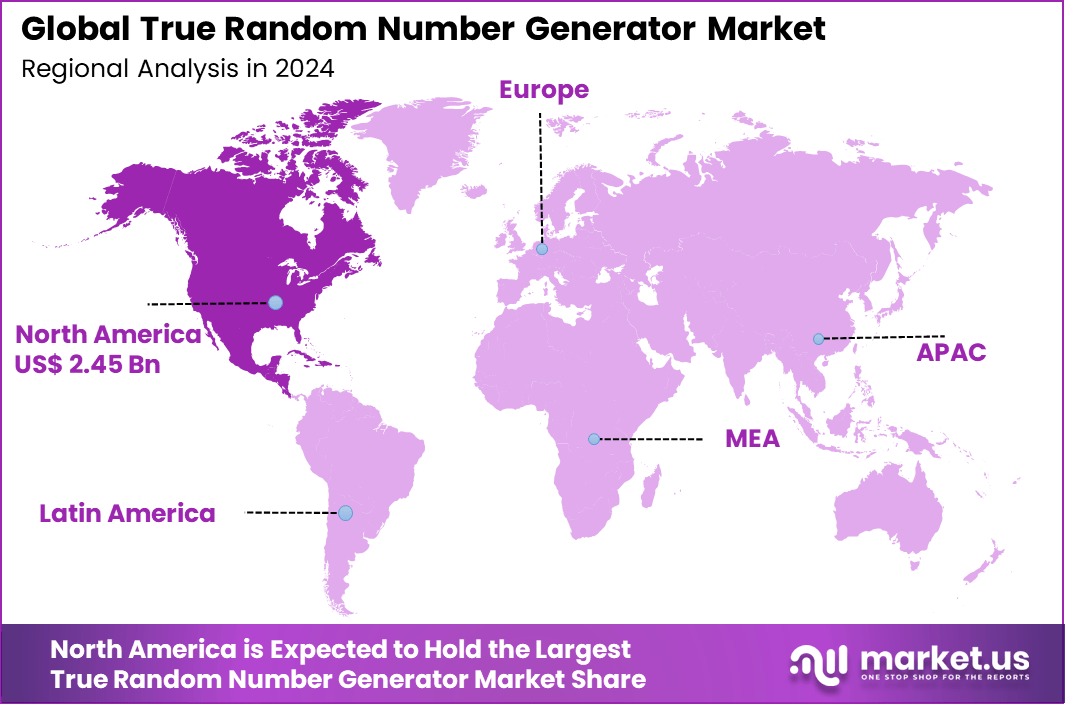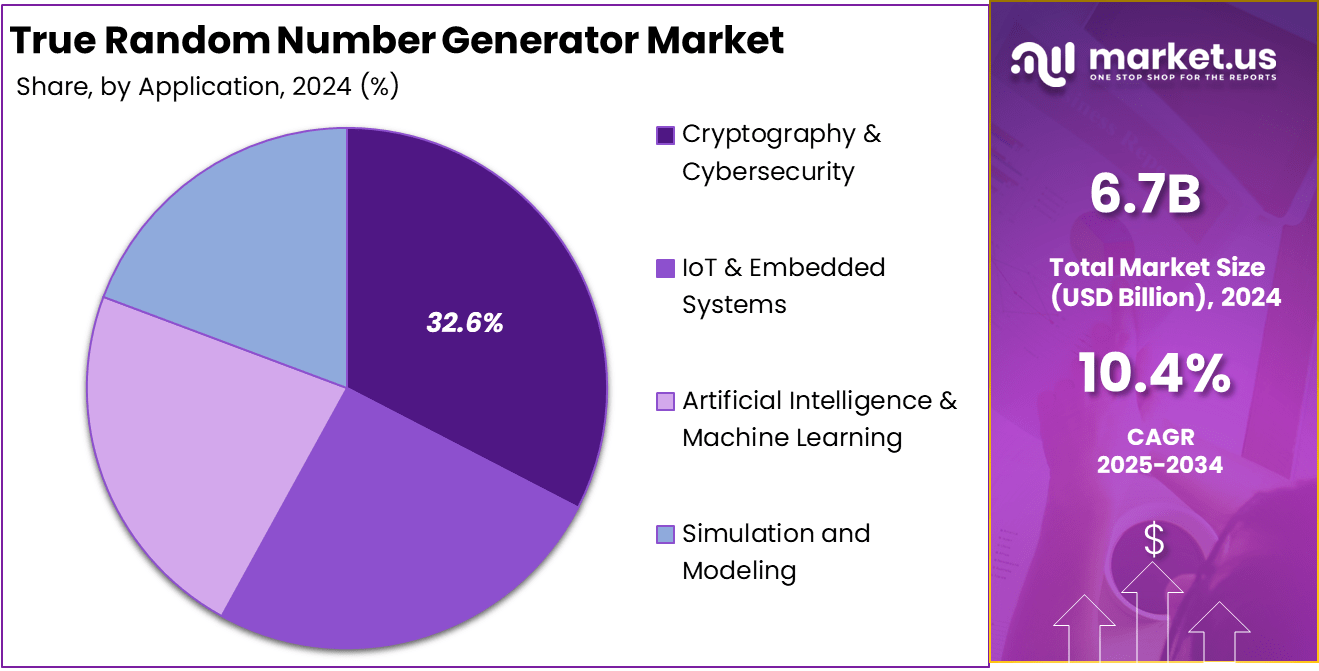Global True Random Number Generator Market Size, Share Report By Type (Free-Running Oscillator (FRO) based TRNG, Noise-based TRNG, Quantum Random Number Generator (QRNG), and Chaos-based TRNG), By Application (Cryptography & Cybersecurity, IoT & Embedded Systems, Artificial Intelligence & Machine Learning, and Simulation and Modeling), By End Use (Enterprises, Consumer electronics, Government Agencies, Financial Institutions, Telecom Operators, and Others), By Region and Companies - Industry Segment Outlook, Market Assessment, Competition Scenario, Trends and Forecast 2025-2034
- Published date: July 2025
- Report ID: 153952
- Number of Pages: 259
- Format:
-
keyboard_arrow_up
Quick Navigation
Report Overview
The global True Random Number Generator market size accounted for USD 6.70 billion in 2024 and is predicted to increase from USD 7.40 billion in 2025 to approximately USD 18.02 billion by 2034, expanding at a CAGR of 10.40% from 2025 to 2034.

Increasing risk of quantum computing is furthering the demand for advanced random number of generators that can ensure strong cryptographic security. Quantum-based True Random Number Generator (TRNG) is receiving traction for high entropy and has their ability to give their unexpectedness. This change is undergoing innovation in chip-scal solutions that support integration in compact devices in motor vehicles, IOTs and safe communication systems.
The Global True Random Number Generator (TRNG) industry focuses on the production and application of devices that generate random numbers based on physical processes, as opposed to the pseudo-random number generators who rely on algorithms. TRNGs used unpredictable events such as electronic noise, radioactive decay, or photon behaviour to ensure randomism, which is important for various applications seeking high security and integrity.
The market is expanding for True Random Number Generator (TRNG) due to increasing demand for increased security in digital transactions and data security. Progress in quantum computing and increasing concerns about data violations and cyber-attacks are also innovating within the industry. Companies are working on developing more efficient, reliable and cost -effective true random number generators (TRNG) to meet the growing needs of different sectors.
For instance, In January 2025, Elmos Semiconductor, a Germany-based electronics firm, and ID Quantique signed a Memorandum of Understanding to co-develop a compact monolithic Quantum Random Number Generator (QRNG) chip. The chip, measuring only 2mm x 2mm, is designed to deliver high-performance quantum randomness for secure embedded applications.
Key Takeaways
- In 2024, the Free-Running Oscillator (FRO) based TRNG segment held a dominant market position, capturing more than a 35.7% share of the Global True Random Number Generator Market.
- In 2024, Cryptography & Cybersecurity held a dominant market position, capturing more than a 32.6% share of the Global True Random Number Generator Market.
- In 2024, the Enterprises segment held a dominant market position, capturing more than a 28.5% share of the Global True Random Number Generator Market.
- The US True Random Number Generator Market was valued at USD 2.08 Billion in 2024, with a robust CAGR of 8.4%.
- In 2024, North America held a dominant market position in the global True Random Number Generator Market, capturing more than a 36.6% share.
U.S. Market Size
The U.S. True Random Number Generator Market was valued at USD 2.08 Billion in 2024 and is anticipated to reach approximately USD 4.66 Billion by 2034, expanding at a compound annual growth rate (CAGR) of 8.4% during the forecast period from 2025 to 2034.
The U.S. True Random Number Generator (TRNG) market is observing significant growth inspired by increasing demand for safe, random number production in various fields such as cyber security, gaming and cryptography. An important tendency is an increase in demand for quantum-saf cryptographic solutions, in which TRNG plays an important role in ensuring data security.
For instance, In January 2025, MicroCloud Hologram Inc., a U.S.-based technology service provider, introduced a groundbreaking Quantum Random Number Generator (QRNG) built entirely on the principles of quantum walks. Leveraging quantum properties like superposition and entanglement, this innovation marks a significant advancement in generating truly unpredictable random numbers for secure digital systems.

The market is dominated by progressive technologies, which can enable the development of more compact and efficient True Random Number Generator (TRNG) devices. Additionally, increasing concern over data privacy and increased cyber threats is accelerating True Random Number Generator (TRNG) in applications such as digital payments and safe communication.
In 2024, North America held a dominant market position in the global True Random Number Generator Market, capturing more than a 34.4% share. The North TRNG market is experiencing a strong growth due to increasing demand in areas such as cyber security, defense and financial services. Quantum is running the field to adopt TRNG solutions with strong investment in computing and encryption technologies.
TRNGs are integrated to ensure rapid secured communication systems, digital payment platforms and block chain technologies to ensure randomise and data integrity. In addition, focusing on data privacy laws and increasing frequency of cyber-attacks is advancing the expansion of the market. U.S. The sector is a leading contribution, in which many prominent players are innovating to improve TRNG performance, reliability and efficiency.

By Type Analysis
In 2024, the Free-Running Oscillator (FRO) based TRNG segment held a dominant market position, capturing more than a 35.7% share of the Global True Random Number Generator Market, due to its superior reliability, speed, and cost-effectiveness.
FRO-based TRNGs leverage the inherent randomness of an oscillator’s noise to generate random numbers, making them ideal for high-performance applications in cryptography, secure communications, and financial services. They offer several advantages over other TRNG technologies, such as simple design, scalability, and compatibility with integrated circuits, ensuring efficient mass production.
For instance, in October 2024, CEA-Leti announced to launch a open-source project to produce physical True Random Number Generators (TRNG) using ring-oscillator-based architectures. Targeting industry and academic researchers, the comprehensive toolkit includes reference designs, emulation tools and analytical tools to facilitate development and characterization of hardware TRNG implementations.
Application Analysis
In 2024, the Cryptography & Cybersecurity segment held a dominant market position, capturing more than a 32.6% share of the Global True Random Number Generator Market, due to the increasing need for secure, unpredictable data in encryption and data protection systems. The True Random Number Generator (TRNGs) are integral to generate cryptographic keys, digital signature and other cryptographic operations, which ensure strong security framework.
As cyber threats continue to increase, the demand for TRNG solutions has increased in this segment, especially with increasing dependence on digital transactions and communication. For instance, In 2025, cybersecurity leaders are adopting True Random Number Generators (TRNGs) to strengthen encryption by ensuring unpredictable key generation across secure communications, blockchain, and cloud systems.
TRNGs play a crucial role in reducing risks linked to predictable or pseudo-random algorithms. Companies such as Quantum Computing Inc. and ID Quantique are pushing TRNG innovation to support quantum-safe cryptographic solutions, addressing rising threats in modern cybersecurity.

End Use Analysis
In 2024, the Enterprises segment held a dominant market position, capturing more than a 28.4% share of the Global True Random Number Generator Market, primarily driven by the increasing need for secure, random data generation in industries such as cybersecurity, financial services, and defense.
Enterprises require True Random Number Generator (TRNG) to increase encryption, ensure data integrity, and especially safe communication protocols in areas of important infrastructure. For instance, companies like ID Quantic have made significant progress in integrating True Random Number Generator (TRNG) technology into their encryption solution for enterprise-level cyber security.
In addition, progress in blockchain and safe digital payments has increased the demand for True Random Number Generator (TRNG) in enterprise applications. TRNGs provide high-quality randomness required for cryptographic functions, which are required for the prevention mechanisms of decentralization and fraud.
Key Features & Trends of TRNGs
Feature/Trend Details Physical entropy sources Use electronic noise, quantum phenomena, or other uncontrollable physical processes for true randomness High-entropy cryptographic keys Essential for strong encryption in security-critical industries Integration into SoCs, FPGAs, ASICs Embedded in hardware for secure boot, data protection, and secure transactions Low power and high speed Continuous innovation for energy efficiency and rapid generation, crucial for automotive and IoT devices Compliance with global standards TRNGs increasingly meet or exceed FIPS 140-3, NIST SP800-90B, and Common Criteria certifications AI-enhanced TRNG validation and monitoring AI/Gen AI methods verify randomness, detect anomalies, and adapt to evolving threats Hybrid TRNG/PRNG architectures Use of TRNGs to seed or enhance PRNGs for scalable, reliable randomness Product miniaturization and integration Suited for embedded, battery-powered systems without compromising randomness quality Drivers
Advancements in Quantum Computing
Quantum computing represents a revolutionary shift in how we process information. Unlike classical computers that rely on binary bits (0s and 1s) to represent data, quantum computers use quantum bits or “qubits,” which can exist in multiple states simultaneously due to quantum superposition. This ability allows quantum computers to solve certain problems at an exponentially faster rate than classical computers.
In the context of the True Random Number Generator (TRNG) market, advancements in quantum computing play a crucial role. Quantum computers are capable of performing complex calculations and simulations that classical computers struggle with, especially in encryption and cryptography.
This has raised significant concerns about the security of existing cryptographic methods, particularly those based on pseudo-random number generators (PRNGs) and classical encryption algorithms, as quantum computers could potentially break these systems by leveraging their computational power to solve mathematical problems that are practically infeasible for classical computers.
Restraint
Limited Availability of Advanced Hardware
One of the challenges affecting the widespread adoption and growth of the True Random Number Generator (TRNG) market is the limited availability of advanced hardware. TRNGs rely on specific physical processes, such as thermal noise, radioactive decay, or quantum phenomena, to generate truly random numbers.
These processes require specialized and often costly hardware, such as highly sensitive sensors, detectors, or quantum systems, which are not universally accessible or easy to manufacture. This limitation is particularly apparent when compared to the more widely available pseudo-random number generators (PRNGs) that only rely on algorithms and do not require specialized hardware.
TRNG devices, due to their hardware requirements, tend to be more expensive and complex to deploy, especially for smaller companies or developing regions. Moreover, the process of creating advanced hardware that can accurately capture quantum or thermal noise or implement quantum-based randomness often involves intricate precision and calibration.
Opportunities
Integration with Quantum Computing
The integration of True Random Number Generators (TRNGs) with quantum computing represents a significant opportunity for the TRNG market. As quantum computers are poised to revolutionize computing power, they also introduce a potential threat to traditional cryptographic methods that rely on pseudo-random number generators (PRNGs).
Current cryptographic protocols, such as RSA and ECC (Elliptic Curve Cryptography), which are widely used for securing data, could become vulnerable once quantum computers achieve the ability to break them. This is due to quantum algorithms like Shor’s algorithm, which could efficiently solve problems that underpin the security of many classical encryption systems.
Quantum computing introduces a new dimension of randomness, stemming from quantum mechanical phenomena like the superposition and entanglement of particles. As a result, True Random Number Generator (TRNGs) are positioned to work harmoniously with quantum systems, offering a solution that is resilient against the power of quantum computers.
True Random Number Generator (TRNGs) generate truly random numbers based on unpredictable physical processes such as electronic noise or photon behavior, which are critical for cryptographic functions in quantum-safe algorithms. As quantum computing develops, there’s a growing need for random numbers that are not just computationally hard to predict (as is the case with PRNGs), but also unpredictably secure, even in the face of quantum decryption capabilities.
Key Market Segments
By Type
- Free-Running Oscillator (FRO) based TRNG
- Noise-based TRNG
- Quantum Random Number Generator (QRNG)
- Chaos-based TRNG
By Application
- Cryptography & Cybersecurity
- IoT & Embedded Systems
- Artificial Intelligence & Machine Learning
- Simulation and Modeling
By End Use
- Enterprises
- Consumer electronics
- Government Agencies
- Financial Institutions
- Telecom Operators
- Others
Key Regions and Countries
North America
- US
- Canada
Europe
- Germany
- France
- The UK
- Spain
- Italy
- Russia
- Netherlands
- Rest of Europe
Asia Pacific
- China
- Japan
- South Korea
- India
- Australia
- Singapore
- Thailand
- Vietnam
- Rest of APAC
Latin America
- Brazil
- Mexico
- Rest of Latin America
Middle East & Africa
- South Africa
- Saudi Arabia
- UAE
- Rest of MEA
Key Players Analysis
The TRNG market is witnessing steady advancements, with leading players driving innovation in hardware-based cryptographic solutions. Apple Inc. and IBM Corporation are integrating TRNGs into their secure chipsets and quantum research initiatives, focusing on data protection and system integrity. These companies are adopting advanced entropy sources to reduce the predictability of encryption keys.
ID Quantique, Infineon Technologies AG, and Microchip Technology Incorporated are playing a vital role in developing quantum-safe and embedded TRNG technologies. These firms offer dedicated hardware components used in smart cards, IoT modules, and automotive control systems. Their solutions are widely used in sectors such as defense, finance, and telecommunications.
Companies such as NXP Semiconductors, Qualcomm Incorporated, and STMicroelectronics are focusing on integrating TRNGs into consumer-grade chipsets and wireless communication products. These firms are enhancing mobile processors and edge devices by embedding secure cryptographic functions at the silicon level. Emerging players like Quantum eMotion and Terra Quantum are exploring novel quantum entropy methods to disrupt conventional randomization models.
Top Key Players in the Market
- Apple Inc.
- IBM Corporation
- ID Quantique
- Infineon Technologies AG
- Microchip Technology Incorporated
- NXP Semiconductors
- Qualcomm Incorporated
- Quantum eMotion
- STMicroelectronics
- Terra Quantum
- Others
Recent Developments
- In June 2025, AWS launches quantum random number generator. The cloud giant is using an Australian university’s technology to help customers access random numbers for experiments through an API.
- In April 2025, Quantinuum announced that its Quantum Random Number Generator software, Quantum Origin, received validation from the National Institute of Standards and Technology (NIST), confirming its compliance with rigorous cryptographic standards.
- Earlier, in February 2025, IonQ entered into a definitive agreement with SK Telecom and ID Quantique to acquire a controlling stake in IDQ. This strategic move strengthens IonQ’s position in quantum-safe technologies by integrating IDQ’s global expertise in quantum networking and sensing.
Report Scope
Report Features Description Market Value (2024) USD 6.7 Bn Forecast Revenue (2034) USD 18.02 Bn CAGR (2025-2034) 10.4% Base Year for Estimation 2024 Historic Period 2020-2023 Forecast Period 2025-2034 Report Coverage Revenue forecast, AI impact on market trends, Share Insights, Company ranking, competitive landscape, Recent Developments, Market Dynamics and Emerging Trends Segments Covered By Type (Free-Running Oscillator (FRO) based TRNG, Noise-based TRNG, Quantum Random Number Generator (QRNG), and Chaos-based TRNG), By Application (Cryptography & Cybersecurity, IoT & Embedded Systems, Artificial Intelligence & Machine Learning, and Simulation and Modeling), By End Use (Enterprises, Consumer electronics, Government Agencies, Financial Institutions, Telecom Operators, and Others), Region Regional Analysis North America – US, Canada; Europe – Germany, France, The UK, Spain, Italy, Russia, Netherlands, Rest of Europe; Asia Pacific – China, Japan, South Korea, India, New Zealand, Singapore, Thailand, Vietnam, Rest of Latin America; Latin America – Brazil, Mexico, Rest of Latin America; Middle East & Africa – South Africa, Saudi Arabia, UAE, Rest of MEA Competitive Landscape Apple Inc., IBM Corporation, ID Quantique, Infineon Technologies AG, Microchip Technology Incorporated, NXP Semiconductors, Qualcomm Incorporated, Quantum eMotion, STMicroelectronics, Terra Quantum, and Others Customization Scope Customization for segments, region/country-level will be provided. Moreover, additional customization can be done based on the requirements. Purchase Options We have three license to opt for: Single User License, Multi-User License (Up to 5 Users), Corporate Use License (Unlimited User and Printable PDF)  True Random Number Generator MarketPublished date: July 2025add_shopping_cartBuy Now get_appDownload Sample
True Random Number Generator MarketPublished date: July 2025add_shopping_cartBuy Now get_appDownload Sample -
-
- Apple Inc.
- IBM Corporation
- ID Quantique
- Infineon Technologies AG
- Microchip Technology Incorporated
- NXP Semiconductors
- Qualcomm Incorporated
- Quantum eMotion
- STMicroelectronics
- Terra Quantum
- Others










